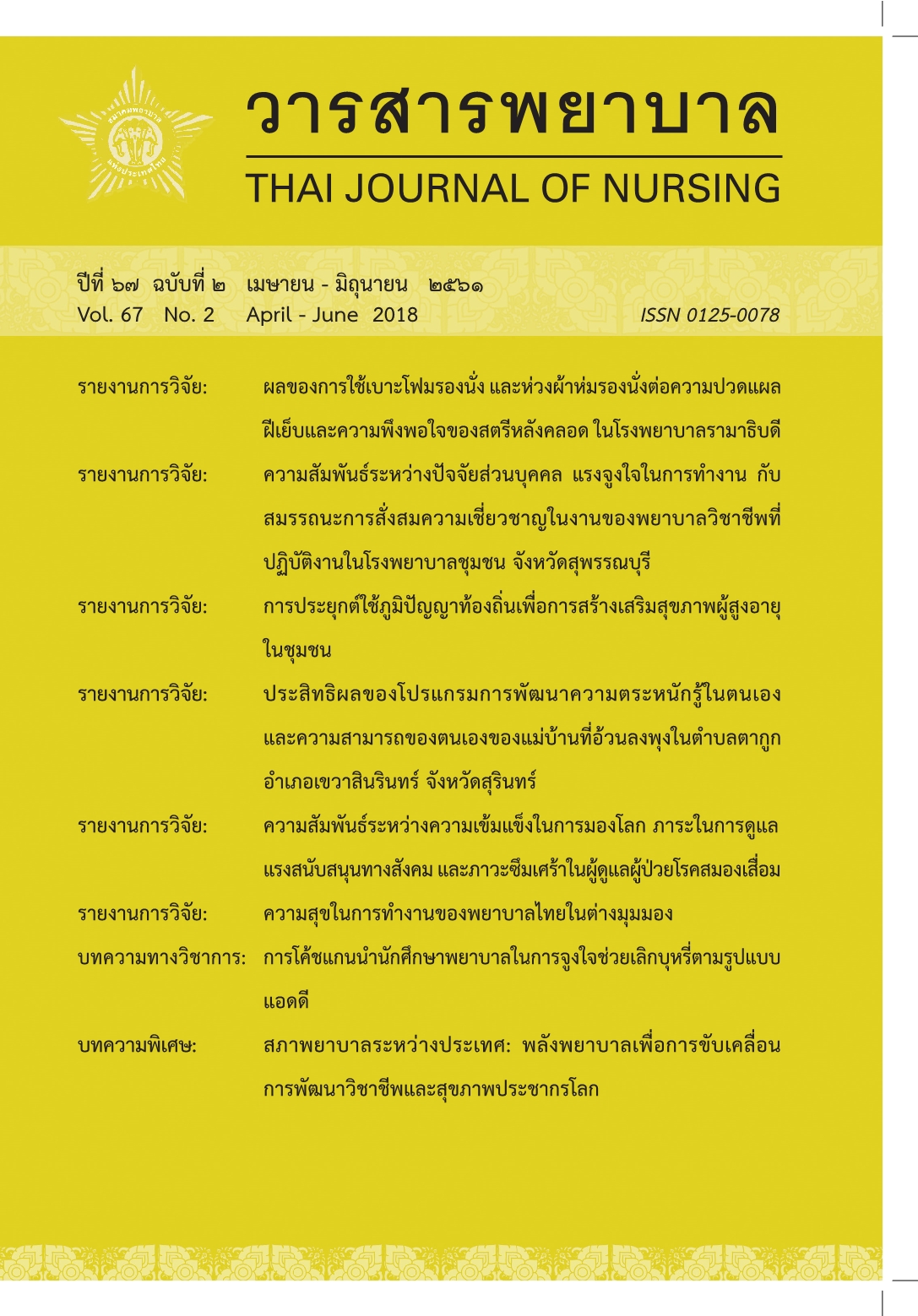Application the local wisdom for developing health promotion among older adults in community
Main Article Content
Abstract
The objective of this action research was to develop the application of local wisdom for developing health promotion among older adults in community. Purposive sampling was used to select the participants from elderly leader group, health promotion leader group in elderly population, and older adult group who live in Tha Khuent, Amphoe Tha Sala, Changwat Nakhon Si Thammarat. The study processes consist of three phases. The data were collected using a questionnaire, focus-group discussion, individual interview, brain-storming, and observation. Content analysis was used in data analysis. The results found that application the local wisdom included three characteristics: 1) individual level; using loincloth for body massage and the use of local herbs and vegetables to cook for the elderly, 2) group level; knowledge and storytelling through audio cable, circle dance mortar beith, and happy esiimsi, and 3) local wisdom for promoting good attachment; massage and spell the media, guide children to nurse the elderly, happy calendar, folk tales and nursery rhymes to teach children, and shell pulley exercise. Elderly perceived themselves and their friend that they had change to the positive lifestyle which increased their happiness
Article Details
References
กรุงเทพมหานคร: ผู้แต่ง.
นัยนา หนูนิล สายฝน เอกวรางกูร เรวดี เพชรศิราสัณห์ และเจนเนตร พลเพชร. (2550). การศึกษาขุมทรัพย์
ทางสุขภาพในชุมชน. รายงานวิจัยของสำนักวิชาพยาบาลศาสตร์ มหาวิทยาลัยวลัยลักษณ์.
มูลนิธิสถาบันวิจัยและพัฒนาผู้สูงอายุไทย. (2558). สถานการณ์ผู้สูงอายุไทย พ.ศ. 2557. กรุงเทพมหานคร:
อมรินทร์พริ้นติ้งแอนด์พับลิชชิ่ง.
มูลนิธิสถาบันวิจัยและพัฒนาผู้สูงอายุไทย. (2560). สถานการณ์ผู้สูงอายุไทย พ.ศ. 2559. นครปฐม: พริ้นเทอรี่.
เรวดี เพชรศิราสัณห์ ศิริอร สินธุ สายฝน เอกวรางกูร อุไร จเรประพาฬ และเจนเนตร พลเพชร. (2550).
ความสุข และวิถีการสร้างเสริมสุขภาพ: ความต้องการที่แตกต่างระหว่างคนสามวัยในครอบครัว
ไทย. วารสารพยาบาล, 56(1-2), 23-31.
สำนักงานปลัดกระทรวงสาธารณสุข, สำนักนโยบายและยุทธศาสตร์. (2558). สาระสุขภาพ. ค้นเมื่อวันที่ 4
ธันวาคม 2559, จาก http://wops.moph.go.th/ops/thp/thp/userfiles/file/Issue%2024-58.pdf
หงษ์ บันเทิงสุข. (2560). ภูมิปัญญาท้องถิ่นด้านพิธีกรรมและความเชื่อในการดูแลสุขภาพจิตของผู้สูงอายุใน
ชุมชนโพนเมือง อำเภอเหล่าเสือโก้ก จังหวัดอุบลราชธานี. วารสารวิจัยสาธารณสุขศาสตร์
มหาวิทยาลัยราชภัฎอุบลราชธานี, 6(2), 30-42.
อภิชัย มงคล วัชนี หัตถพนม ภัสรา เชษฐ์โชติศักดิ์ วรรณประภา ชลอกุล และละเอียด ปัญโญใหญ่. (2544).
การศึกษาดัชนีชี้วัดสุขภาพจิตคนไทย(ระดับบุคคล). ขอนแก่น: คลังนานาวิทยา.
Nantsupawat, W., Kamnuansilapa, P., Sritanyarat, W., & Wongthanawasu, S. (2010). Family relationships,
roles and the meaning of active aging among rural Northeastern Thai elders. Pacific Rim International
Journal of Nursing Research, 14(2), 137-148, 112.
Stahl, T., Rutten,A., Nutbeam, D., Bauman, A., Kannas, L., Abel, T., et al. (2001). The importance of the social
environment for physically active lifestyle -- results from an international study. Social
Science and Medicine, 52(1), 1-10.
Vogelsang, E. M. (2016). Older adult social participation and its relationship with health: Rural-urban
differences. Health & Place, 42, 111-119.
Walsh, K., & O’Shea, E. (2008). Responding to rural social care needs: Older people empowering
themselves, others and their community. Health & Place, 14(4), 795-805.
World Health Organization. (2016). Promoting health in the SDGs. Report on the 9th Global conference for
health promotion, Shanghai, China, 21-24 November 2016: All for health, health for all. Geneva: Author.


